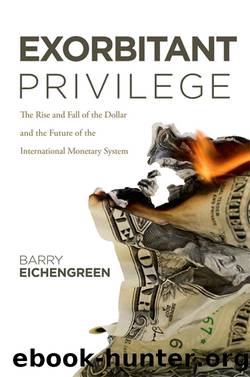Exorbitant Privilege by Eichengreen Barry

Author:Eichengreen, Barry
Language: eng
Format: epub
Publisher: Oxford University Press, USA
Published: 2011-08-14T16:00:00+00:00
NO MORE COZY LIVING
A further ingredient in this toxic brew was the intensification of competition. The Glass-Steagall Act separating commercial and investment banking and limiting the investment activities of deposit-taking banks was revoked by the Gramm-Leach-Bliley Act of 1999. Commercial banks, now able to more efficiently manage risk, could be entrusted to take on a wider range of investment activities, or so the authors of the bill believed. Defenders of GrammLeach-Bliley object that commercial banks were not at the center of the subprime crisis. It was not they but investment banks that originated CDOs and ended up stuck with the risky equity tranche. It was not they but investment banks and broker-dealers like Bear Stearns that were so dangerously leveraged.
But to argue this point is to miss the big picture. As commercial banks branched into new activities, they disturbed the investment bankers’ cozy lives. Seeing their rents competed away, investment banks responded by moving into riskier activities and using more borrowed money in the scramble to survive. It is no coincidence that Bear Stearns, which once upon a time had earned a comfy living charging fixed commissions for stock trades but now saw this business eroded by deregulation and technological innovation (the emergence of discount brokers like Charles Schwab, for example) took the most dangerous gambles involving the highest levels of leverage.
Competitive pressure was further ratcheted up by financial globalization. The changes in technology and practice fostering the belief that banks could manage more risk and use more leverage while requiring less regulation were not limited to the United States. The same logic implying that financial institutions could master more lines of business and invest in a wider class of assets suggested that they could do business in more places. The European Union, as part of its Single Market program, removed all restrictions on the ability of banks to do business in other European countries. More generally, the period saw a sharp intensification of cross-border competition.
And, again, institutions feeling the chill winds of competition took on more risk in the effort to maintain customary profit margins. The British building society Northern Rock levered up its bets by supplementing the deposits of retail customers with money borrowed from other banks. Icelandic banks offered suspiciously high-interest online savings accounts to British, Dutch, and German households to finance risky bets. Sleepy German savings banks took on some of the worst performing U.S.-originated-and-distributed CDOs. Leverage was even higher among European financial institutions than in the United States. Either false confidence was higher, or the intensification of competitive pressure was greater, or both. In Europe, too, regulators averted their eyes.
Gambling to survive—doubling up one’s bets—is not the only conceivable response to an existential threat. The alternative is to hunker down. Hunkering down in this case would have meant shrinking the enterprise. But compensation schemes provided no incentive to respond in this way. Successful bets meant big paydays. If those bets put the firm in an untenable position tomorrow, well, that was someone else’s problem. The
Download
This site does not store any files on its server. We only index and link to content provided by other sites. Please contact the content providers to delete copyright contents if any and email us, we'll remove relevant links or contents immediately.
Life 3.0: Being Human in the Age of Artificial Intelligence by Tegmark Max(5558)
The Sports Rules Book by Human Kinetics(4386)
The Age of Surveillance Capitalism by Shoshana Zuboff(4292)
ACT Math For Dummies by Zegarelli Mark(4048)
Unlabel: Selling You Without Selling Out by Marc Ecko(3663)
Blood, Sweat, and Pixels by Jason Schreier(3624)
Hidden Persuasion: 33 psychological influence techniques in advertising by Marc Andrews & Matthijs van Leeuwen & Rick van Baaren(3565)
The Pixar Touch by David A. Price(3438)
Bad Pharma by Ben Goldacre(3427)
Urban Outlaw by Magnus Walker(3395)
Project Animal Farm: An Accidental Journey into the Secret World of Farming and the Truth About Our Food by Sonia Faruqi(3221)
Kitchen confidential by Anthony Bourdain(3089)
Brotopia by Emily Chang(3054)
Slugfest by Reed Tucker(3002)
The Content Trap by Bharat Anand(2924)
The Airbnb Story by Leigh Gallagher(2854)
Coffee for One by KJ Fallon(2636)
Smuggler's Cove: Exotic Cocktails, Rum, and the Cult of Tiki by Martin Cate & Rebecca Cate(2540)
Beer is proof God loves us by Charles W. Bamforth(2461)
